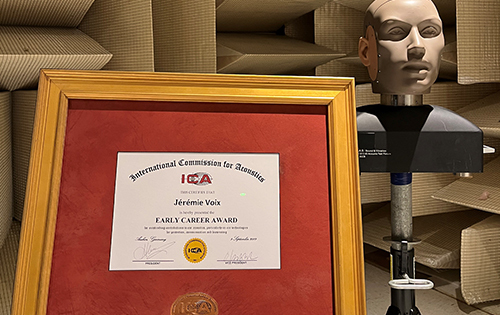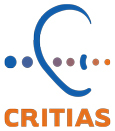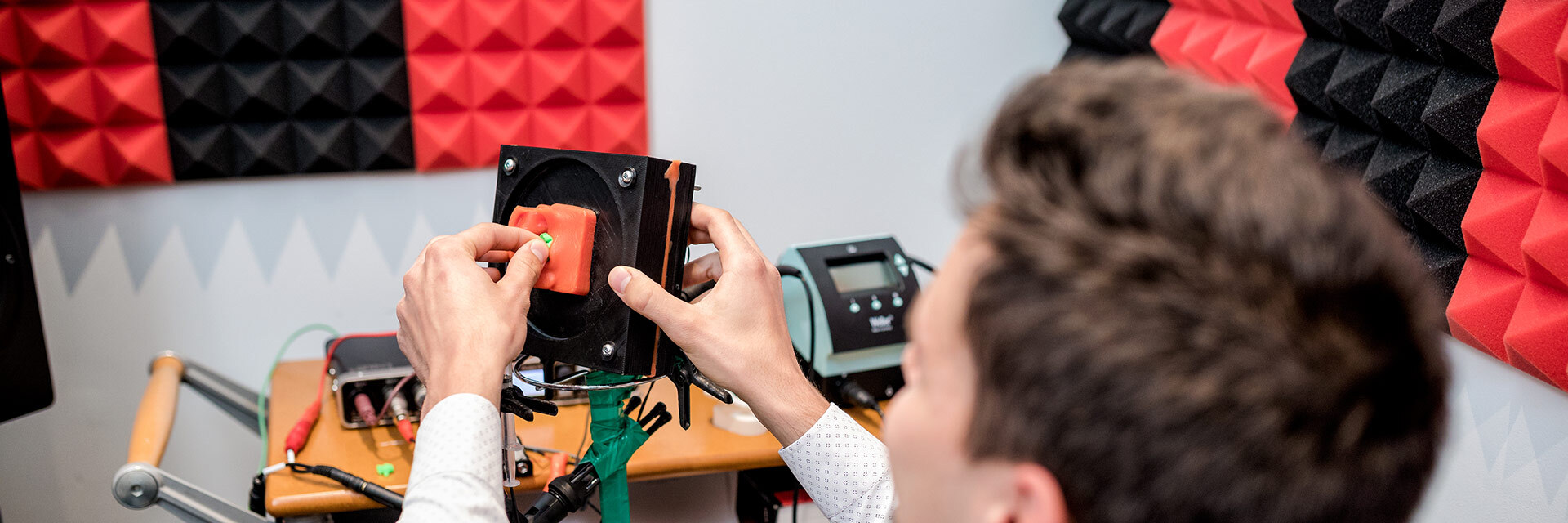Achievements
CRITIAS achievements
The technologies and knowledge developed by the ÉTS-EERS Industrial Research Chair in In-Ear Technologies (CRITIAS) are beneficial for the whole of society. They also contribute to Montréal’s international reputation as a hotbed for occupational health and safety research.
Discover our achievements in the field of hearing health, along with the corresponding benefits.
ÉTS, through its ÉTS-EERS Industrial Research Chair in In-Ear Technologies (CRITIAS) led by Professor Jérémie Voix (Lead Researcher), owns a database of research data pertaining to in-ear technology, including but not limited to speech recording, noise sound levels, dimensions and 3D models (the CRITIAS Database).
Professor Voix believes in Open Science, and therefore, since the 2010 release of Access to Research Results: Guiding Principles by the three federal granting agencies – the Canadian Institutes of Health Research (CIHR), the Natural Sciences and Engineering Research Council of Canada (NSERC) and the Social Sciences and Humanities Research Council of Canada (SSHRC) – included a commitment to develop a shared approach for improving access to publicly funded research in keeping with internationally recognized best practices, standards and policies for funding and conducting research, a formal request was made to ÉTS to make some datasets from the CRITIAS Database available in open access through its CRITIAS:DB Open Access Data Repository from Borealis Dataverse repository.
The access to certain datasets within the CRITIAS:DB Open Access Repository, solely for the purposes of its research project, is governed by a Data Access Agreement, and can be requested through the Borealis Dataverse repository.
After a request has been submitted to the Database Management Committee and the ÉTS Research Ethics Committee for approval, and after a review, the Access Recipient will be granted a limited access right to the Dataset, subject to the terms and conditions indicated in the Data Access Agreement.
The Auditory Research Platform consists of a pair of custom earpieces that are instantly custom-fitted using the technology developed by EERS, along with a dedicated hardware circuit with Digital Signal Processor, Microcontroller and I/Os.
The video below details the many features of ARP V1.0 as a research platform for auditory applications.
- Antoine Bernier, Fabien Bonnet and Jérémie Voix. 2022. System and method to perform in-ear noise dosimetry and personal attenuation rating under an electro-acoustic earplug while excluding wearer-induced disturbances and separating exposure sources. WO2021081671A1, issued on September 7, 2022.
- Gabrielle Crétot-Richert, Aidin Delnavaz, Valentin Pintat, Guilhem Viallet and Jérémie Voix. 2021. In-ear and around-the-ear electroencephalography system with floating electrodes and method thereof. US-20210177352A1, issued on June 17, 2021.
- Thomas Habrant, Hami Monsarrat-Chanon, Vincent Nadon and Jérémie Voix. 2021. System, device and method for assessing a fit quality of an earpiece. US-11115750-B2, issued on April 21, 2021.
- Rachel E. Bouserhal, Tiago Falk and Jérémie Voix. 2020. Device and method for improving the quality of in-ear microphone signals in noisy environments. US-10783904-B2, issued on September 22, 2020.
- Aidin Delnavaz, Mikael Ducharme, Hami Monsarrat-Chanon, Olivier Valentin, Guilhem Viallet and Jérémie Voix. An Intra- and circum-aural EEG brain computer interface. US-20200275856-A1, issued on September 3, 2020.
- Guilhem Viallet and Jérémie Voix. 2020. Method and device for determining an ear canal size. WO-2020160674-A1, issued on August 13, 2020.
- Annelies Bockstael, Dick Botteldooren, Jean-Marc Lina, Vincent Nadon and Jérémie Voix. 2020. Method and device for continuous in-ear hearing health monitoring on a human being. US-10736546-B2, issued on August 11, 2020.
- Frédéric Laville and Jérémie Voix. 2020. Method and apparatus for objective assessment of in-ear device acoustical performance. US20200196078A1, issued on June 18, 2020.
- Frédéric Laville and Jérémie Voix. 2020. Method And Apparatus For Objective Assessment Of In-Ear Device Acoustical Performance. US10645505B2, issued on May 5, 2020.
- Alexis Martin and Jérémie Voix. 2020. System and method for determining cardiac rhythm and/or respiratory rate. US-20200196977-A1, issued on April 15, 2020.
- Frédéric Laville and Jérémie Voix. 2020. Method and apparatus for objective assessment of in-ear device acoustical performance. USRE47938E1, issued on April 7, 2020.
- Annelies Bockstael, Dick Botteldooren, Jean-Marc Lina, Vincent Nadon and Jérémie Voix. 2020. Method and device for continuous in-ear hearing health monitoring on a human being. US10548516B2, issued on February 4, 2020.
- Fabien Bonnet, Hugues Nélisse, Marcos Nogarolli and Jérémie Voix. 2019. Method and system for measuring in-ear effective sound exposure under an earplug or without an earplug and for determining a wearer induced disturbance. US-20210236339-A1, issued on November 14, 2019.
- Rachel Bouserhal, Patrick Cardinal, Philippe Chabot, Hami Monsarrat-Chanon and Jérémie VOIX. 2019. In-ear nonverbal audio events classification system and method. US-20200312321-A1, issued on May 2, 2019.
- Antoine Bernier and Jérémie Voix. 2019. Active hearing protection device and method therefore. US-10238546-B2, issued on March 26, 2019.
- Antoine Bernier, Jean-Nicolas Laperle, Jakub Mazur and Jérémie Voix. 2018. Advanced Communication Earpiece Device and Method. US10097149B2, issued on October 9, 2018.
- Michael C. Turcot and Jérémie Voix. 2016. Pressure regulation mechanism for inflatable in-ear device. US-20110079227-A1, issued on May 18, 2016.
- Frédéric Laville and Jérémie Voix. 2016. Method and apparatus for objective assessment of in-ear device acoustical performance. US8254587B2, issued on April 29, 2016.
- Antoine Bernier, Jean-Nicolas Laperle, Jakub Mazur and Jérémie Voix. 2016. Advanced communication earpiece device and method. US-20160119732-A1, issued on April 28, 2016.
- Frédéric Laville and Jérémie Voix. Method and apparatus for objective assessment of in-ear device acoustical performance. US9167365B2, issued on October 20, 2015.
- Michael C. Turcot, Michael Maloney and Jérémie Voix. 2015. Settable compound delivery device and system for inflatable in-ear device. US-9107772-B2, issued on August 18, 2015.
- Jean-Nicolas Laperle and Jérémie Voix. 2014. In-ear device with selectable frequency response. US-8903114-B2, issued on December 2, 2014.
- Aidin Delnavaz and Jérémie Voix. 2014. Energy harvester device for in-ear devices using ear canal dynamic motion. US-9281764-B2, issued on October 23, 2014.
- Antoine Bernier, Jean-Nicolas Laperle, Jakub Mazur and Jérémie Voix. 2014. Advanced communication earpiece device and method. US20140010378A1, issued on January 9, 2014.
- Frédéric Laville and Jérémie Voix. Method and apparatus for objective assessment of in-ear device acoustical performance. US8254586B2, issued on August 28, 2012.
- Steve Boa, Katrin Braun, Michael C. Turcot, Jérémie Voix and Lawrence Yane. 2011. Head-mounted device for settable compound delivery system for inflatable in-ear device. US-9216114B2, issued on July 7, 2011.
- Francis Bernier and Jérémie Voix. 2011. In-ear device. US-D635677-S, issued on April 5, 2011.
- Francis Bernier and Jérémie Voix. 2011. In-ear device. US-D635676-S, issued on April 5, 2011.
- Frédéric Laville and Jérémie Voix. 2003. Method and apparatus for determining in situ the acoustic seal provided by an in-ear device. US6687377B2, issued on October 29, 2003.
Chairholder
Professor Jérémie Voix has received a number of awards and distinctions in recent years:
- ICA Early Career Award by the International Commission for Acoustics (2019)
- Prix IRSST – Club des Ambassadeurs (2018)
- Most promising invention Award from Gala Reconnaissance ÉTS (2018)
- Hommage reconnaissance pour contribution exceptionnelle – Ordre des ingénieurs du Québec (2017 – Acknowledgement of exceptional contribution)
- Research and Innovation Ambassador by ÉTS University’s alumni (2016)
- ÉTS Board of Director’s Prix d’excellence en recherche – Chercheur émergent (video, in French) (2016)
- Innovation | Inspiration Award from TechnoMontréal technology cluster for his work and leadership (2012).

CRITIAS-EERS partnership
The CRITIAS-EERS partnership has been cited as a successful collaborative model:
- Partner of Excellence in Research and Innovation Award from ÉTS (2021)
- Partnership Prize at the Innovation Awards by the Association pour le développement de la recherche et de l'innovation du Québec (2019)
- Dr. Rachel Bouserhal, a Postdoctoral Researcher at CRITIAS, won the MITACS & NRC-IRAP Award for Commercialization (2018)
- Award for Partner in Technology Transfer by ÉTS (2017).
EERS
- The SonX product jointly developed with EERS was acclaimed internationally:
- Invention of the Year Award, Québec Science magazine (2019)
- Gold Winner for Innovation in Voice and Hearing Technology Category by the Edison Awards (2017)
- 1st prize Readers' Choice by Industrial Safety and Health News magazine
- 1st prize winner at HEAR & NOW Noise Safety Challenge by the US alliance of OSHA-NIOSH-MSHA (2016).
- The co-developed SonoFit technology has been recognized by editors of Popular Science as the Product of the future – CES2011, and was later awarded by the International CES Innovations 2012 Design and Engineering Award and the Edison Award in 2014.


